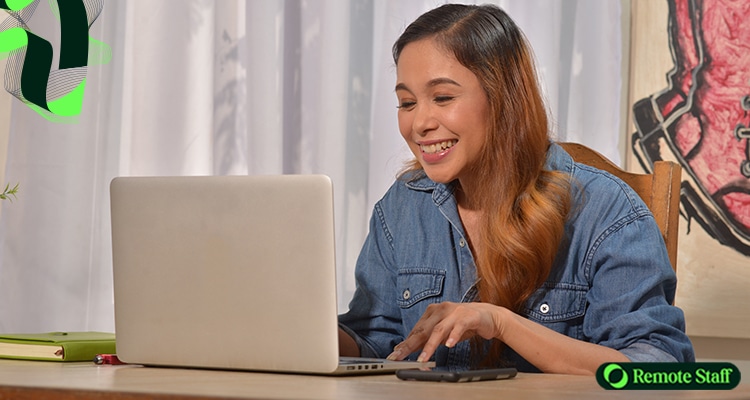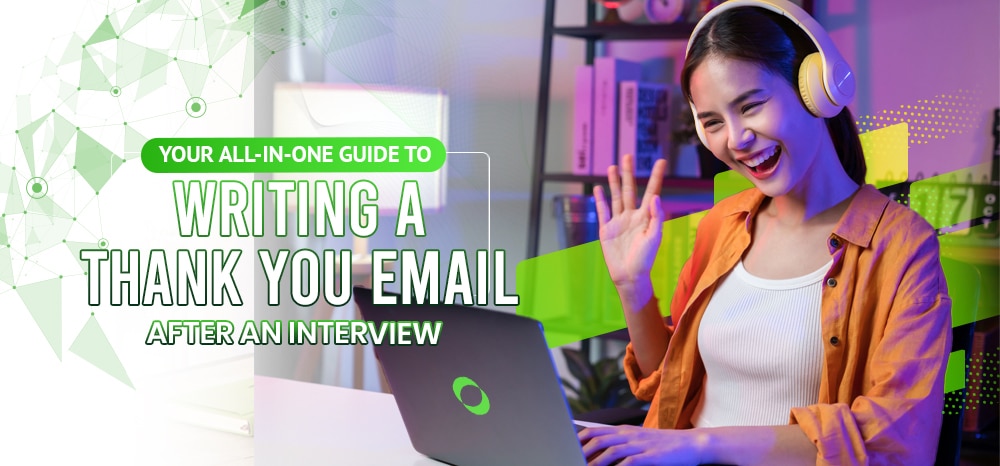So, you’ve finished your online job interview, got through all the interview questions well, and (hopefully) impressed your interviewer.
Now, all you have to do is sit back, relax, and await your interview results. Right?
One crucial step that many applicants often forget is sending a thank you email to their interviewer afterward.
Expressing thanks after an interview isn’t just a mere formality; it’s also a great way to form a deeper connection with your interviewer and increase your chances of getting hired.
Besides these, what are the other benefits of sending a thank you email after your online work from home job interview? Also, how do you write one? Let’s find out.

The Benefits of Writing a Thank You Email After Your Interview
Besides being proper business etiquette, sending a thank-you email gives you several advantages. Here are some of them:.
It Helps You Stand Out from the Other Applicants
Although it seems redundant today, thanking your interviewer increases your chances of getting hired.
According to a study, only one in four applicants sends a thank you email to their interviewers after an interview.
However, eighty percent (80%) of HR managers said these letters helped determine whether they should hire a candidate.
So, if you want to remain ahead of the competition, especially now that everyone’s looking for work from home jobs, don’t forget to write a thank-you email.
It Displays Your Professionalism and People Skills
Deeds speak louder than words.
Sending a well-written thank-you email within the day of the interview demonstrates your ability to express gratitude – and to summarize the interview’s crucial points.
It Shows You’re Interested in the Job
Employers don’t want to invest time in an applicant who seems uninterested in the role they’re hiring for.
Although you may have several other interviews to attend, sending an appreciation email to them shows you’re interested in the position since you’re grateful for the opportunity.

How to Write a Thank You Email
Now that we’ve discussed its benefits, how do you write a thank you email? Here are some pointers to remember:
Writing the Subject Line
Be concise and clear about what the email is all about in your subject line.
It can help to add your name to the subject line so your interviewer knows the email is from you straight away.
Be mindful of your tone: if you’re applying to a multinational corporation, write a more formal subject line. However, if you’re applying to a startup or a smaller business, you can show more enthusiasm and warmth.
Here’s an example of a typical subject line: “Thank you very much for the interview – Juan De la Cruz.”
Personalizing the Greeting
Today, you can greet your interviewer with a casual “Hello” or “Hi.” However, you can still use a more formal greeting if it’s more appropriate.
How you address them depends on how they introduce themselves during the interview. If they introduced themselves by their first name, for instance, you can lead with that.
Check the spelling of their name on the company’s website if you need to.
Writing the Body
Your email’s first line should always be thanking your interviewer for their time.
Next, reference a memorable point during the interview to help them remember who you are – and to demonstrate that you were listening well.
Afterward, reiterate how you can provide value to the company, such as identifying a problem you discussed and how your skills and experience can help resolve it.
Avoid using emojis and slang. Remember, they’re still your potential employer.
Also, keep your email concise, as your interviewer may not read it if it’s too long. Ideally, your email should only be around two paragraphs or between eighty and one-hundred-fifty words.
Concluding Your Thank-You Letter
Finally, end your email on a positive and professional note with the appropriate sign-off. Some examples of these include: “Sincerely,” “Kind regards,” and “Best wishes.”
Don’t forget to include your contact information, such as your email and cellphone number, in your email signature.

Sample Thank-You Emails You Can Use
Here are some samples you can use to make your own:
Example 1
Subject Line: Thank you for your time. – (Your Name).
Hello (Name of your interviewer),
I greatly appreciate that you took the time to meet me today about the (position) at (name of company). I am excited about this opportunity and believe I’ll be a great addition to your team.
As we discussed during the interview, my experience as a (previous position) at (previous company) matches your requirements for this role, specifically my (relevant activity related to the topic).
Sincerely,
(Your Name)
(Contact information)
Sample 2
Subject line: Thank you for meeting me this morning. – (Your name).
Dear (Name of your interviewer),
Thank you for taking the time to interview me for the (role you’re applying for) position. It was a pleasure meeting you – and I thoroughly enjoyed learning more about the opportunity to become part of your team.
I would be a great asset to the company due to my (relevant skills and qualifications). As discussed earlier, my experience at (previous company/work-related experience) has helped prepare me for this role.
Given the opportunity, I’m confident my skills and experience will be an excellent fit for this position. I look forward to discussing this opportunity with you soon.
Kind regards,
(Your name)
(Contact information)

A Simple Thank You Goes a Long Way
Though it may initially seem an unnecessary formality, a thank you email can help set you apart from the competition and land the job.
Using the steps above, you’ll have an easier time crafting your own thank you email after your interview.
Ready to apply these tips after an online job interview, but don’t know where to start looking for one? Remote Staff is here to help.
Our jobs list contains plenty of available positions for you to choose from. These range from online transcription and design jobs to online architecture and engineering jobs.
So, what are you waiting for? Sign up here. Good luck!

